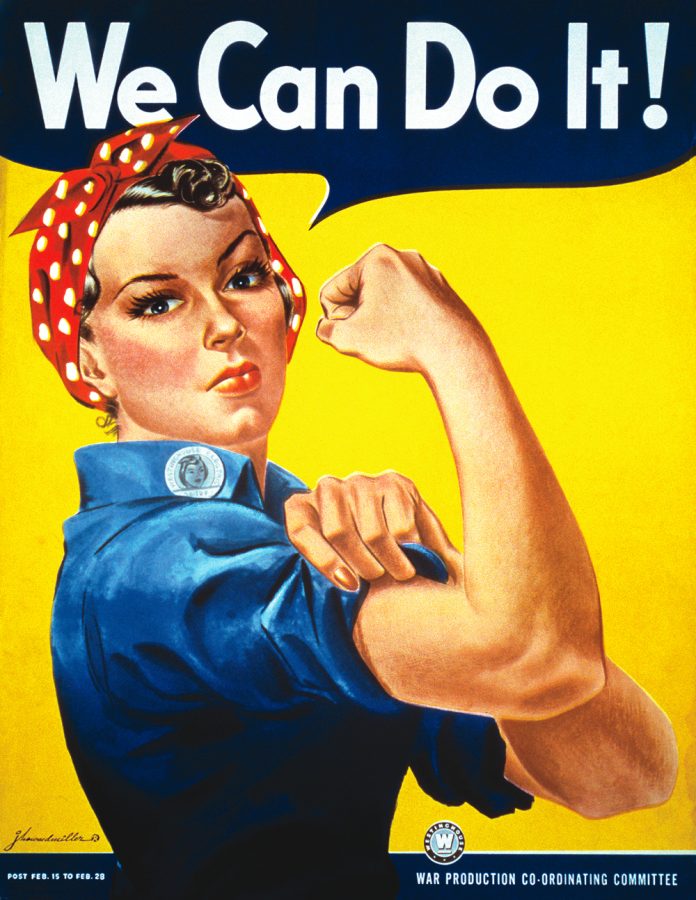Start Stereotyping Me
Addressing the negative stigma surrounding stereotypes
Rosie the Riveter pushing past stereotype barriers and bringing new ones to light. During WWII Rosie was a symbol of societal advancement surrounding stereotypes.
January 2, 2019
To a society that condemns differences:
I am sick of hiding.
So sick that some days I do not want to face the day. So sick that I avoid certain people and topics for fear of rejection. For fear of being ridiculed without first being allowed to have a conversation and offer an explanation. For fear of not being accepted or understood. For fear of having to live my whole life worried about offending someone, so instead, I remain silent.
But why should I stay silent when so many others are like cannon shots firing off in my ears? Loud. Overpowering. Deadly.
I am, of course, speaking of the traumatic, negative effects that come with stereotyping. Stereotyping is a pandemic. It travels across oceans, over mountains, and through desserts; wrapping and tightening its grip on people of all different races, cultures, and ethnicities. At least 1 in 4 U.S students say they have been bullied, and bullying is defined as someone using their superior strength or influence over someone else. Stereotypes are what give a bully this superior strength and influence. Everyone is guilty of stereotyping and to say otherwise is against human nature.
The brain is the most complex organ in the body and is still in many ways a mystery to even the most experienced doctors and scientists with the most letters behind their names. But what is known is the brain constantly is taking in information and growing. It takes past experiences, memories, and people you know and organizes these things into categories. These categories then build your preferences. Such as whether you prefer strawberries over apples, playing an instrument over playing a sport, or reading the book over watching the movie. Our brain uses this same organizational system when meeting someone new. From the first moment we lay eyes on them, our brain goes to work and in that matter of milliseconds, it is able to take in information and process an immediate conclusion. It does not matter how wrong or offensive or incorrect this conclusion may be, it is still there.
Lately, activist groups and organizations have been trying to rid schools, the workplace, and communities of stereotypes. Unfortunately, they have been struggling in vain. No amount of political correctness will suppress man’s innate desire to categorize people. The solution is not to eradicate stereotypes.
The solution is to start stereotyping.
Not just any stereotypes. Positive, kind, meaningful, intentional, stereotypes. There is a correct way to stereotype and instead of getting rid of something, that used in the right way can be good, we need to teach people how to correctly stereotype. Everyone needs this lesson; students, CEOs, garbage men, store clerks, lawyers, and teachers. By eliminating negative stereotypes surrounding things like race, politics, and religion; a community is able to grow closer together and replace their originally negative feelings about one another, with positive and uplifting stereotypes.
Replacing the “jocks are stupid” and instead highlighting “kids who play sports are very fit.” Choosing to say “true Islamic morals are based on good things like faith, good conduct, and being kind to others” instead of “Muslims are terrorists and evil people.”
No longer would anyone be ashamed of who they are or fear rejection. People would be able to celebrate the things that make them who they are and celebrate others as well.
I am a Christian. I am black. I am gay. I am a Republican. I am athletic. I am a musician. I am a lawyer. I am a construction worker. I am an American.
I am a person. You are a person. We are people. That is what matters.
Really, it all comes down to, if as a society we are ready to; start being proud of who we are and stop condemning people different from us; start looking at the good parts of people and stop looking at the mistakes; start teaching people to change and adapt and stop getting rid of something when we have a problem with it.
It takes time. It takes listening. It takes patience. It takes people.
Signed, simply a person.



